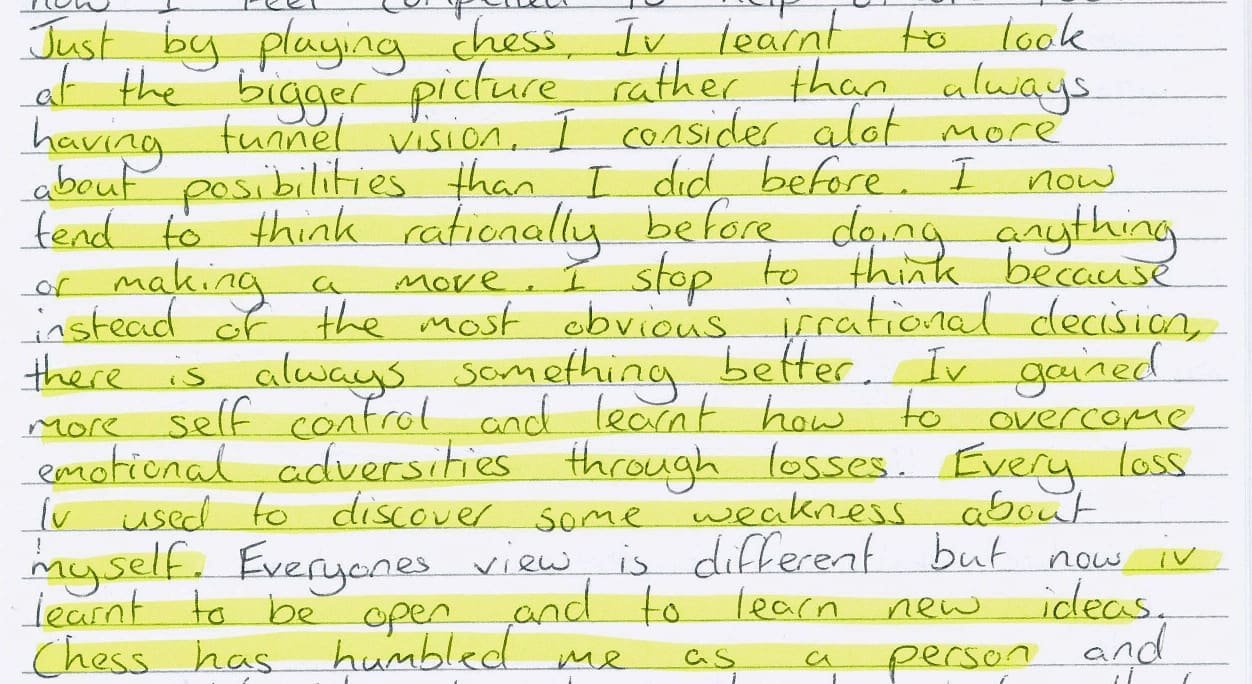
CSC in Prisons
The CSC Prisons' Programme has been growing steadily in recent times. We currently deliver weekly chess clubs in 10 prisons: Bellmarsh ISIS, Brixton, Bronzefield, Highpoint, Hull, Leeds. Lewes, Rye Hill, Thameside, Wandsworth, and Wealstun. In addition, CSC has run or supported clubs at the following prisons: Erlestoke (generously supported by The Walter Guinness Charitable Trust), Liverpool, Parc, and Wormwood Scrubs.
If you are in the prison service and are interested in talking to us about developing a chess programme in your institution, please contact us here. If you are interested in working as a CSC tutor in a prison, please contact our Prison Coordinator, Peter Sullivan.
Why chess in prisons?
Chess offers inmates critical skills for life on the outside. It is a game of consequences that trains people to think before acting. Chess can help prisoners to think logically and solve problems, it develops sportsmanship and resilience and it teaches people to plan ahead and take responsibility for their actions. In addition:
Chess can help to relieve the the inevitable isolation and boredom that comes from being locked up for long periods. We offer chess sets to prisoners who attend our courses for them to use during free association time and in their cells.
Chess can help to build resilience and self-esteem and teach prisoners how to channel aggression and lose gracefully.
Participation can not only improve health and behaviour but can directly contribute to efforts to reduce reoffending
A positive sporting achievement can provide the motivation and skills for people to turn their lives around
Chess is a readily available, low-cost, purposeful activity.
You can read more about the benefits of playing chess in prisons in this article by Professor Rosie Meek of Royal Holloway, University of London.
Testimonials
It is no exaggeration to say that for some prisoners, being able to play and study chess is transformational, assisting with mental health and for others preventing isolation. For many it is a welcome distraction that passes time constructively.
Our prisons coordinator Peter Sullivan writes:
''I saw something at XXXXXXX this week that brought a tear to my eye. There is a cell at the end of every wing with iron bars rather than a door, so officers can keep an eye on men at risk of self-harming. Sometimes officers are on 24-hour watch. I saw a man this week sitting in the middle of the floor hugging his knees. On the spur of the moment, I asked him if he could play chess. He nodded so I gave the officer a set. He said the man could not have it, he had no personal possessions not even bedsheets, but he set up the board on a plastic packing case. When I came back, they were both sitting on the floor playing. The prisoner could reach the pieces through the bars and another officer was suggesting a move. There was something about the starkness of the cell and the gentle way the officers were engaging with him that was quite moving.''
You can read more about Peter's work in prisons here.
A prisoner writes: The chess club is amazing. It stimulates the mind and makes being in prison that little bit easier. It also attracts the right kind of person you want to meet in prison. It is a natural filter. It keeps your mind active and in shape, a challenge when you are in prison. It would be nice to have the club more than once per week, it not to have it at all would be so wrong. It is such a positive plus for the prison. Chess club is hugely interactive, educational and most importantly massive fun! I like the welcoming and dynamic atmosphere most and find it very helpful in addressing rehabilitation.
A second prisoner writes: I really enjoy Chess Club a lot. I’ve actually learned a lot since I started attending. I was taught a lot that I didn’t know. Plus it’s extra time out of my cell doing something I enjoy. When I was out of Prison I had no interest in chess. It was very complicated, and now I am really getting the hang of it. I reckon we should get more sessions weekly as every week more and more people want to get involved. And maybe even start doing competitions for prizes.
You can read more about the effects of chess programmes in prisons around the world here.






